Screenwriter The case details the screenwriter's skills and teaches you how to create a successful script
A successful script should have "complex characters"
New York University is the highest school of American cinema, and it has trained famous film artists such as Arian Lee, Martin Scorsese, and Spicer Lee. Ms. Jenette Nebris, a professor of drama at New York University, concludes that a successful script must have complex characters, wonderful dialogue and clear stories. Beyond that, writing a script must have two effective motivations: anger and enthusiasm. If we don't write the script from these two starting points, it probably won't produce too good a work.
Characters:
Before the screenwriter writes, he should do his homework on the characters, first of all, determine who the main characters and the secondary characters are. Weaving the history of each character from their birth, giving each character a one-page resume. Imagine the physical characteristics of each character, to see each character in the play's real movements and sounds and smiles.
Second, determine what the strengths and weaknesses of each character are. It is often one thing to pay attention to the advantages and disadvantages. Our success or failure is often determined by the same quality, such as that randomness is a person's strength, but anger comes from it;
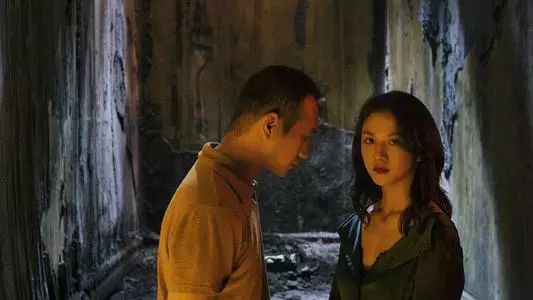
Third, determine what each character is after in the play. Every character should be eager to want something, and is ready to fight for it, which is the character's purpose and pursuit. Then ask yourself specifically in each play, what is the goal of each character? At the end of the play, do the characters get what they want?
Fourth, determine what the characteristics of each character's speech are. Usually in the diary can be kept a sloppy note of the conversation heard by chance, listen to people in different conversations, be sure to make each character with an absolutely personalized voice in the speech.
Fifth, in the whole plot development of the play, to ask yourself, how each character changes? What has each character learned from these changes, and have they not learned anything? Characters must be different at the end and beginning of the story, and they should be changed by a series of plots in the play.
Scene:
Brain to have a clear venue, scene and environment, determine the exact location of the behavior in the play, and the setting of the scene. If it does, it will add truth to your plot. Every object in the scene should be visible in the screenwriter's mind, so that when writing each play, the objects in the scene can be used. If there's a duck in the house, or a clock, or an apple, play your imagination and make everything matter in the plot. In addition, the design of the environment is equally important. You must have a clear understanding of the geographical environment in which the characters are in the play, and in any moment, any action can enter your inner field of view from the outside.
Story:
The events in the play should have a "domino effect" at the beginning, and the screenwriter should ask himself what motivates you to start writing the script. Is it a picture, a word, or a thing. Understanding the original purpose of the play can help you concentrate. In order to write the real event that led to the birth of your play into a better play, this requires you to change some details and keep the narrative away. Therefore, although the heroine in real life did get what she wanted, and in the play, the heroine can be set greater difficulties, which can make the play have a stronger pressure.
Behavior in one play should advance behavior in another, a series of events superimposed on each other, and there should be a "domino effect". A major question should be raised in the play, and all powerful plays should be created with a focus on the important questions. There is a clear main plot to make the play has a center, the audience and playwright can also be more clearly stated the meaning of the play. The humor in the play is from the intensity of the plot, and there is humor in the most serious tragedy. The best humor comes not from funny lines, but from the comedy within the character's behavior.

Comedy can't be created without simple stories and happy endings, and creating a comedy usually requires a simple and clear story and a happy ending. Usually, the ending is a big reunion that the audience can expect. A commonly used comedy technique is "fish out of the water", which is to place a character in an environment that is unfamiliar to him, producing comedy contradictions, such as the movie "Crocodile Dundee" is a typical example: another is "unmasthed couples", that is, the two characters, backgrounds are very different people set into a romantic object, can also produce a lot of comedy conflicts, such as "Meet the father-in-law."
Excellent script should have a clear theme, to adapt literary works into films, first of all, the plot of literary works into a gradual development of the story line, the main characters in the story listed, and select the most dramatic plot points in literary works before the decision can be made from where to start. Then, choose to retain and abandon the plot, must abandon the part including landscape description and character psychological description and so on. After completing the steps above, rewrite some plot to get a more dramatic scene. Finally, decide on the retention, abandonment and merger of the main characters.
Originality:
Refined; wonderful dialogue, character lines with characteristics - personalized voices; clear themes: conveying contemporary-related themes, historical themes to be written in common with the modern world; a strong sense of identity with at least one character in the play: the story is interesting - the reader is willing to spend time and energy to understand what is going to happen.

Screenwriters are required Wonder System: How do you make your story look better?
Second, teach you how to write the script's story outline
This is your hard-earned creation of tens of thousands of words of novels or script advertising, after writing, please double-check, repeatedly modify. Those well-known publishers or investors will use these hundreds of words to get a first look at the strange and excellent work of your work, generating the initial publishing/investment impulse.
As long as we fully understand the importance of story outline, an author who has the ability to master the text and has the talent to tell a good story can write an excellent story outline.
The summary of the story achieves the following objectives:
1. Describe the names, genders, identities, ages, appearances, personalities and temperaments of the main characters (which can be adjusted according to actual needs).
2. Say what the hero is going to do (get rich, get promoted, get revenge, fight for supremacy, get married, etc.).
3. Make it clear what the hero is saying about the meaning and difficulty of doing this. Example: Men's No. 1 to win the "campus singer contest" to win the love of school flowers. The difficulty is that the school flower itself also participates in the competition, not only super strength, but also the victory of the super strong heart, hatred of anyone who beats her.
4. Explain the outcome of the event. The result is one of the main points of concern to the reader. There is an idiom called "tiger's head and tail", and it is estimated that there is such a thing in the world. According to reading experience, the results of many novels are a great disappointment.
5. A novel conveys an emotion through a story. There are several types of feelings, and the story is changing. Experienced editors can naturally see from the story the feelings it conveys to the reader. Of course, if you really have a fresh and profound understanding, it's great to write a few words here that can be a warning. But this is the icing on the cake;
An example of a more simple story outline:
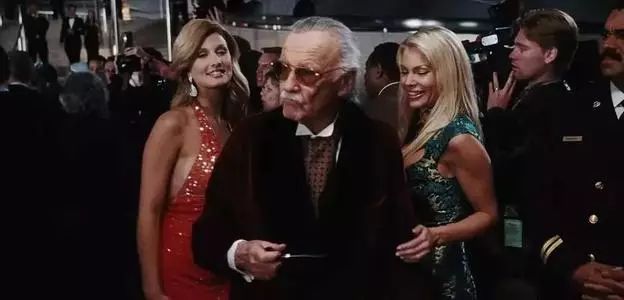
Title: The Godfather
Author: Mario. Puzo
After World War II, several large families of the American Mafia began a new competition. Vito. The Corleons, known as the "Godfather", were between the largest mafia leaders. His youngest son, Michael, an outstanding graduate of Evergreen League School, has been reluctant to participate in family affairs. After his father was seriously injured in the assassination, his older brother Sonny acted for the family. In the negotiations, Michael assassinated the boss of the opposing family and the police officers who were colluding with the undersociety. He fled to Siciri, Italy, where his enemies tracked him down and killed his wife. Sonny, the elder brother who presided over the family affairs, was also killed by the enemy. After his old godfather recovered, he negotiated peace with his opponent, and after a year on the run, Michael returned to the United States. After the death of the old godfather, Michael cleared the inner adultery, launched a revenge plan, and was revered as the new "godfather" after his success.
When: World War II just ended, 1946.
Location: United States, Italy.
People: Old Godfather, Michael.
Features: Old Godfather, old-timer; Michael, from white-road elite candidate to mafia boss.
Main event: revenge, fight for supremacy.
Difficulty: The vendetta's poisonous means.
Meaning: Save yourself and destroy your opponent.
Result: Michael became the new godfather.
First look: The undersection that was first revealed in the novel.
Second point of view: the old godfather in the novel described the so-called "wisdom of life."
Comment: This outline is very simple, the clue is clear, see point clearly.
An example of a more gorgeously written story outline:
Title: "Shan Han"
Author: Bandit I think
A teardrop-like crystal clear letter, a long-standing sprinkling of gold notes, tell the two paragraphs to death of the sad and happy clutch.
The beloved man, holding the beautiful bride in her hand, was her sister. This thought, the heart is like dead ash, but the blood of relatives deep hatred so that she had to be enemies with her lover. However, the sudden break-in, beautiful as magic man, is the antidote to redemption, or the poison of love?
When she returned again, she made a covenant with him and becoming a beautiful goddess of revenge, a common enemy of the blade. However, after all, she is only a popular person in the red dust, forget the past, but can not jump love hate greed. And he, Satan's love will be blessed?
Flower people walk flowers without a master, that bright and unseemly fragrance cold, that sad despair of the fate of the world, a hundred years later, is still glowing?
Comment: This outline is written more gorgeous, there are flowers, flowers first and then brocade.
A more detailed example of a story:
Title: "Falling in Love with Single Eyelid Boys"
Author: Sebum
Han Zixuan and Jiang Yi are two successful men who are college classmates and competitors. Han Zixuan's nature is unruly, I do what I do, Jiang Yi is gentle, loyal and honest appearance.
For many years, Jiang Yi has been looking for revenge on Han Zixuan, when he learned that Han Zixuan fell in love with a girl, he decided to cross-knife love, and use that girl to retaliate against Han Zixuan.
Youth lovely Song XI, in the university to read marketing management, after graduation want to go to Jiang Yi's company to work, but Yin and Yang wrong to Han Zixuan's company. But she never thought Han Zixuan was the third brother who grew up with her in an orphanage. Years of difference so that Song 11 and Han Zixuan have made great changes, but the two people have been silently thinking of each other.
Song Eleven in the collision of work and life, irresistible love of Han Zixuan, and hope that through their efforts, han Zixuan's company can achieve results. Because of her kindness and naivey, and because of Jiang Yi's careful intervention, but each counterproductive. Han Zixuan also had a great misunderstanding of her.
In the battle with Han Zixuan, Jiang Yi made every effort to force Han Zixuan to the Jedi. But can not escape is Jiang Yi in the process of using Song ELEVEN really fell in love with Song ELEVEN, he even at any cost to hurt for his sincere pay for the remaining jin. But no matter how hard he tried, Song 11 refused to change his feelings for her Han Zixuan. This makes Jiang Yi think of the past, more hate Han Zixuan. So the two men fight for dignity and love. First, Jiang Yi sabotaged Han Zixuan's new product research and development plan and used despicable means to obtain Han Zixuan's top secret formula, in order to annex Han Zixuan's company.
All this for the good Han Zixuan is not prepared, but Song ELEVEN in the two men's competition, more cherish Han Zixuan, they love sincerely, love strong, love hard to give up.
Jiang Yi, who has worked hard, has finally made the new product launch a great success. However, when the first day of the new product market, only to find that their products actually lost to Han Zixuan company's strong products, the collapse of the army. Jiang Yi people rich, angry into anger, design kidnapped Song ELEVEN. Han Zixuan in order to rescue Song ELEVEN, encountered Jiang Yi's pursuit, seriously injured in the arms of his beloved woman ... He gazed at Song Eleven for a long time... Leave...... Leave......
In the commercial war filled with love, we can quietly feel the romance of classical love.
Comment: This outline is written in more detail. The characters are distinctive, and the relationships are complex and clear.

Half-mirror VIP students One subscription, free for life (limited time ongoing)
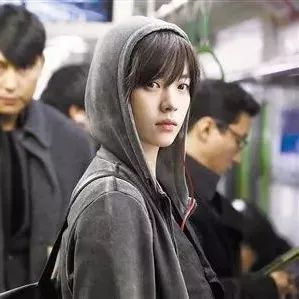
Screenwriters are required The Foundation of Story Creation: How to Become a Master storyteller?
Common deviations from story outlines:
(1) Water account. The author tries to include more details, resulting in a less prominent focus. After reading it, I can't remember what happened.
(2) Say the concept, talk about the feeling, can't see the story.
(3) The plot line narrative is not clear, can not see the logic of the hero's behavior.
(4) The arts don't make sense. The written person is either not serious enough or the writing skills are not enough. I am an editor, and one occupational disease is "text-picking obsessive compulsive disorder". According to several of my editorial friends, they also have this occupational disease. I don't think a person who doesn't take his writing seriously can write a good book of 100,000 words.
Description: Story outline, story outline, content introduction in this article means the same.
Third, the script writing 10 key points
A play contains a lot of content. If you think you can write a script by sitting down and writing a pen, you're wrong. Like cars, the script consists of many parts, not only that, but they must also be arranged properly and do their part. It takes thousands of parts to build a car, and writing a script is just as complicated. However, all the red tape inside can be refined into 10 points. With these 10 key points in mind, you'll no doubt write a better script.
1. Storyline and characters
The writing of the script usually comes from two points: the idea of high concept, the development of distinct characters, or the combination of the two.
2. Write an outline before you write
Before you start writing a script, at least be clear about how the story begins and ends, and set five main plot points.
3. Three-act structure
Professionals may argue over "a play/paragraph", but both agree to use a three-act structure to tell the story, and both the first and second act end at a turning point.
4. Originality
A clear and concise writing style is key, and the action description must be kept in four lines or less, but the action must be original.
5. Script format
Professional script format and proper page layout are also essential: there must be a lot of whitewriting, no "I" throughout, and a good plan for page distribution.
6. "What's next?" "
All scenes should push the story, or show the characters, or both. Anything that has nothing to do with it is unnecessary and should be cut off.

7. Short scene
The script should move quickly, and three pages of script is enough before moving on to the next location, usually only half a page.
8. The dialogue is concise
Remember, movies are visual media, stories are performed, not told. So try to keep the conversation as concise as possible.
Within 9.120 pages
A one-page script is equivalent to a minute in a movie, so a play usually lasts two hours (120 pages), while a comedy usually approaches 90 minutes (90 pages).
10. Be clear about the plot
In short, you have to tell "what's the story about" and compare it to other successful Hollywood films.
Pixar's 22 narrative tips
Pixar sub-mirrorist and director Emma Coats recently tweeted 22 narrative tips, including one that read, "It's hard to end, so you have to write the ending first." Here's her secret:
You appreciate a role because he doesn't just work for success.
2. You have to go after things that the audience finds interesting, not things that the screenwriter finds interesting. The two are very different.
3. It's important to try to find the subject, but you won't know what the story says until you're done. Now rewrite it.
4. Once upon a time. Every day. One day, I'm not. That's why. That's why. Finally.
5. Simplify, focus, combine characters, and jump off detours. You'll feel like you've lost something precious, but it'll set you free.
6. What does your character do and like? Give them the opposite. Challenge them. How do they respond?
7. Write the ending before you write the middle paragraph - I'm serious. The ending is hard to write, so write it down first.
8. End even if the story is not perfect. In an ideal world, you'd end up with the perfect story, but move on now. Write better next time.
9. When you encounter a bottleneck, list what will never happen in your story. Do more to organize your thoughts and inspiration will come.
10. Break down your favorite stories. The part you like is part of you; you have to acknowledge it before you can use it.
11. Write the story on paper and let your story take shape. If the story just stays in your head, no matter how beautiful it is, you can't share it with anyone.
12. Ignore the first thing you think of, followed by the second, third, fourth, and fifth - get rid of the obvious and surprise yourself.
13. Make your role stand. You may find passive/adaptive characters cute when you write, but that's poison to the audience.
14. Why are you telling this story? What beliefs support your writing? That's the heart of the story.
15. If you were your character, how would you feel in this situation? To be honest, incredible things can be true.
16. What's your bet? Give us a reason to stick to our roles. What happens if they don't succeed? You have to weigh the pros and cons.
17. No work will be in vain. If a job doesn't work, put it down and move on - it'll always work later.
18. You must know yourself: don't confuse the area between trying and asking for trouble. Stories are tested, not distilled.
19. Coincidence: It's good to get people into trouble by coincidence; it's a fraud to rescue them by coincidence.
20. Practice: Pull out what you don't like in the movie. How do you rearrange them and make them what you like?
21. You have to identify with your situation/role and not just write them "cool". Why would you do that?
22. What is the nature of your story? How do you best tell a story? That's the basis of your story.

V. How to operate your script
Susan Kouguell, an award-winning screenwriter and filmmaker, now teaches screenwriting and film at Tufts University and attends international seminars. She has written several books and has long written articles for the publication, and as chairman of Sucheng Tudong (a film consulting firm founded in 1990), she works with more than 1,000 screenwriters, producers and executives around the world, and her six short films are included in the Museum of Modern Art's permanent collection and exhibited at the Whitney Biennale.
Here are some of her suggestions for how the script works.

Q: How can I get the attention of a studio manager?
A: Write a wonderful play.
Q: What should I do after I finish writing?
A: Get tickets to the film industry.
What you have to do is:
1. Hand in the script to the company only when asked.
2. Research and consult companies that make the same genre and type as you.
3. Study the company's script submission guide and follow it strictly.
4. Use the latest resource catalog. Development executives are always on the move. Employees can change companies, positions, and titles in just one day.
5. Write a fascinating advisory letter, remember to write your manager's name and check the spelling, and don't question your "admirer."
6. Write an outline that accurately summarizes the script, to be concise and wonderful.
7. Set a perfect tone and practice constantly, asking your friends and family for advice and confidence.
8. The essence of writing a script on a page is to use only a description of the text, unless the icon makes it look more professional.
9. Build your social network, attend screenplay seminars and film festivals, and meet filmmakers and other filmmakers and filmmakers.
10. Studio managers always appreciate well-mannered people (and indeed do) and learn that saying "please" and "thank you" can take you further in the industry.
The ability to make stories accounts for more than 80 per cent of the success of a screenwriter/author, while mastering the structure and format of a script or novel can only account for up to 15 per cent. Storytelling is the most basic, important, and core skill of a screenwriter/author. But at present, hundreds of thousands of people in China write scripts, stories can really pass no more than 1%.
Story-making this skill, seriously, the school can not teach, the book is not recorded. It's really hard to find the door path when you're groping yourself. Even if you touch the door, it takes a long time of study and research to master and master. By then you were old.
So how do you quickly learn to make stories?
Learn La Story
A set of unique secrets for training top storytellers
People who've heard it are known as "the people who have heard it."The sunflower treasure trove of the story world”
With help story creators"Open your eyes"and"Get through to the second vein of the governor"Amazing effect."
Whether you're a storyteller or a 50-year-old writer
will open a new hole in your story creation
This is a story-writing course that lets you meet and hate late
Methodology for the creation of stories that you have never heard of

Pull the story
How to become a top storyteller
Courses tailored for professional storytellers
Lecture: Mr. Half Mirror
At present, the most professional, most systematic, most practical "story creation" courses
The new system is fully upgraded
Simpler, more systematic and more practical
6 hours, 52 sections
Introduction to the lecture
Mr. Half Mirror,The author of the suspense story. Writing.”Half-mirror odd talk“Series of stories. Former publisher, and book author. He has written and published physical books100Multiple books. Now living in Shijiazhuang, full-time engaged in story creation and story research, amateur story creation training. Lectures on "La Story 1.0" "Pickpocket Bridge Segment" "The Principle of Story" and other story creation lessons. The "Half-Mirror Talk" series has been launched.
Introduction to the course
"La Story 1.0" is a summary of Mr. Half Mirror's 18 years of practical experience in story writing and writing.Is currently the only system to teach "story creation" courses。The course provides a deep insight into the essential laws of story creation, and many ideas are unique and unique.Not only the heart-to-heart method, teaching internal skills, but also imparting practical story-writing skills. More than eight months after the start of the class,There are more than 3,200 paid students, many of whom are 10-30 years old.Because of the dense dry goods, with a strong subversive and shocking, in the students caused a strong response, word-of-mouth burst shed。
"Pull the story1.0"The course isA system of "story cognition" and "story creation", complete solutions,The purpose isHelp you solve it completely“Make up stories”problems, allows you to quickly get the following gains:
1. Instill in your mind the correct cognition of the "story" system
2. Let you systematically learn how to make stories and master the path to permanently improve your story skills
3.Teach you the process of making up a story, and the steps of science
4. I'll tell youThe story is made up.It's nice and wonderful"Mysteries, methods and techniques
5. Improve your story's judgment so that you can quickly tell the story's good or bad
"La Story 1.0" is not a screenwriter's lesson, but I dare to tell you rescally:
This will be the most correct and worthy "screenwriter lesson" you'll learn in your life!
Not only suitable for all kinds of screenwriters to learn, but also suitable for directing production, fiction writers, web writers, comic book writers, etc. , all want to systematically enhance the "story-making ability" of people!
This is currently the only, systematic teaching of "story creation" of pure dry goods courses!
Fits the object
Film and television screenwriter anime screenwriter fiction writer
Director of the production of online writers comic book writers
Wait for all those who want to improve their ability to make stories
Course features
1. Many years of story creation experience summary, absolutely dry goods full
2. At present, the only systematic and comprehensive story creation course in China
3. Both story-telling and story-telling techniques. Not only is it very practical, but it also allows you to see the heights you can reach in your life to make stories.
4. This lesson will give you a systematic scientific understanding of "story" and "story creation".
5. This is also a top skill training course, the thinking and methods, not only suitable for story-making, almost all complex skills of the practice.
Specific contents
"La Story 1.0" is all online
Here's what it's all about
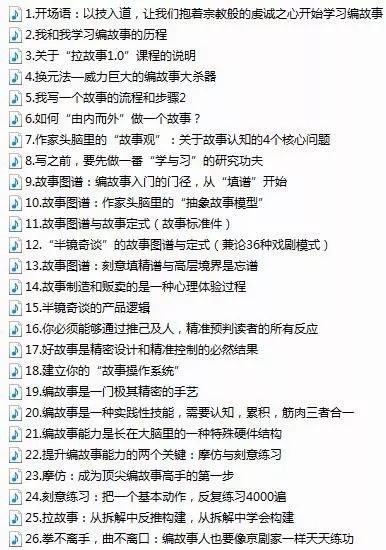
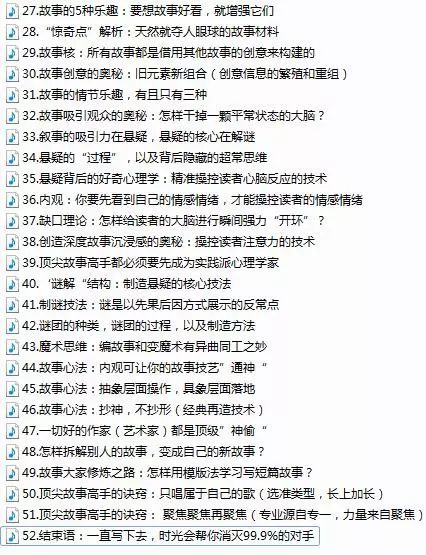
The way you go to class
"Half Mirror Writing Academy" online course platform
Buy now, listen now
Don't wait, don't install APP
One purchase, long-term re-listening
Online platform, simple and convenient
With your cell phone, you can listen anytime, anywhere
Course price
Price.698Yuan.
Buy now and enjoy discounts
Just need it398Yuan.
Offer will close at any time
Please seize your last chance
Please press the QR code long
Preempt it now"La Story"Places.

The course is already online
Buy it now and listen
Let's take a look at what people who have learned to say about the course
Click on the title below to read
↓↓↓↓↓↓
After-school feedback from the 1st-2nd students of the "La Story 1.0" course
↑↑↑↑↑↑
Click on the title above to read
Let's take a look at what people who have learned to say about the course
Here's the story written by Mr. Half Mirror
You point to a few
you can judge the level of his story creation
And the value of this course is not worth listening to
Only those who can really write stories can really teach you to make stories
Want to see the explosive, super-shy anecdotes?
Want to upend the amazing experience of subverting the three views and blowing up the brain hole?
Mr. Half Mirror's Brain Hole Story Collection
Surprise Brain hole suspense reversal
Let you read addictive, want to stop
How to listen
Click below"Read the original text"You can order a class."
Go to "Discovery" - "Take a look" browse "Friends are watching"